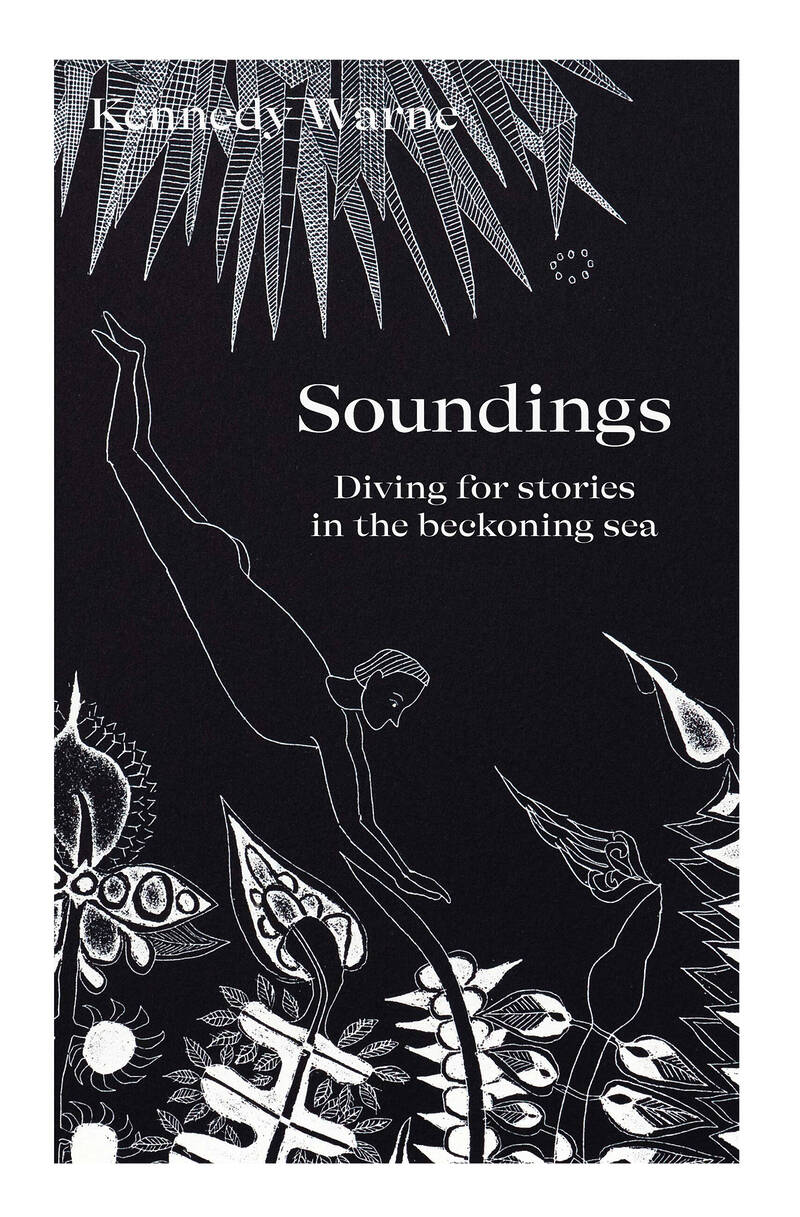Kennedy Warne has travelled the world and seen many amazements in nature, especially under the water, on assignments these past 50 years for National Geographic and New Zealand Geographic, and has fashioned some of these experiences into ‘a memoir of a life with the sea’, Soundings: Diving for stories in the beckoning sea. It’s not really a memoir of a life with the sea. You learn next to nothing about Warne’s life – his relationships, the contents of the rag-and-bone shop of his heart – even though it’s a book told in first-person. ‘When I think of Arabia I think not of oil or the desert but of the sea….I wanted to experience the delta as traditional Okavangans do… I am walking across the Greenland tundra’, etc. He has a more important mission than writing a mirror book. He brings you the wonders and stresses of the big wide underwater world, and some of the wiser ways of approaching it. It’s an entirely selfless book.
It’s also an almost entirely humourless book. The absence of fun drags at the pages, slows the book’s progress. What is it about underwater literature that kills comedy dead? Jacques Cousteau, who Warne references in his first chapter, never wrote un zinger in his many books and TV scripts; Wade Doak, New Zealand’s great chronicler of the what lies beneath, especially around the Three Knights Islands, is a no-LOL zone. Just as there has long been a kind of National Geographicese – information, some colour, a dolorous contemplation of man’s exploitation of the natural world – so, too, has a similar New Zealand Geographicese come about, and established a writing style that is as studious and bright as a government report. Warne has drunk the Kool-Aid of these journaleses, in fact come up with the recipe as co-founder of the always worthy New Zealand Geographic. There is no escape from it in the pages of Soundings.
Warne has come to Soundings to think. And to emote. And to, you know, be at one with nature. ‘A person brings cultural knowledge into an encounter with an animal like a sperm whale…One of the great ecological realisations of the past few decades has been that trees in a forest are not collections of separate individuals, but members of interconnected networks…One of the challenges in developing a custodial ethic towards the sea is that oceans tend to be seen as undifferentiated expanses – spaces more than places’, etc.
But when he shows what you sees, what you step into his flippers, the chin-stroking and the high seriousness of the book fall away. This is no armchair contemplator. This is a guy who has been all over the map, and reports on the experience with genuine enthusiasm, and a thirst for knowledge. His New Zealand Geographic piece a few years ago on Pollen Island – an obscure little shellbank near Te Atatū that over 100,000 vehicles pass by every day on State Highway 16 – is a masterpiece of observation.
Throughout, Soundings is packed with close detail. Here he is, handfeeding sharks five kilometres off the coast in South Africa:
Two or three sharks swam by, ignoring my offering so I thrust the fish more pointedly under the nose of the next in line, a female, and the shark mouthed it hesitantly, delicately, as if sampling it for taste. I could feel the teeth pierce and compress the fish as she pulled it gently from my hand. Then the mouth opened and the fish was gone. It all seemed very genteel….
And I loved this, on Masirah Island, in Oman, where he pops down to a beach one night to watch hundreds of ghost crabs building sand turrets up to 30 centimetres in height:
They spend a lot of time compacting the foundation, thumping the ground with each pincher alternately, as if using a soil compactor. They climb the mountain as they build, eventually standing at the very top to place the last grains of sand…The purpose is to impress females: the higher the mound, the more capacious their burrow for egg-laying. But the turrets are ephemeral. Wind and tide level the sand, and next evening the doughty crustaceans must build their turrets afresh.
Sisyphus of Arabia.
We think of good journalism as shining a torch in forbidden places. Warne is an excellent journalist who shines a torch in some of the most remote places on Earth. His entire chapter on the hunting of harp seal pups in Canada’s Magdalen Islands is a compelling read. Here he is, flying by helicopter to the sea ice, up close and personal in a harp seal nursery: ‘One was so fat it looked to have been inflated.’ LOL, actually! ‘I lay next to another pup and watched tears forming in the glistening black globes of its eyes, run down its fur and drop onto the snow. It was these images of the crying bébé that sparked such outrage against “the butchers of the Arctic”.’ But Warne meets and quite likes the butchers of the Arctic.
That story required hard thinking. Warne was on assignment for National Geographic. ‘At the time I wasn’t much impressed by the overblown rhetoric of the anti-sealing movement…My sympathy learned towards the hunters, who I felt had been unfairly vilified.’
It’s a surprising twist. Hunters are the bad guys in every conservation narrative. We live in our warm homes in electrified hamlets, and deplore the killing of species as seen on TV. Warne has more to offer. He went there. Soundings is a report from one of New Zealand’s most intrepid and best-travelled explorers.



